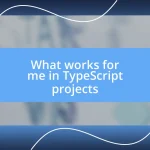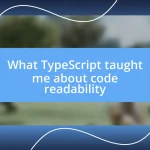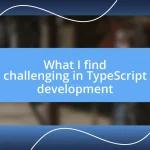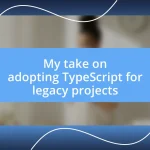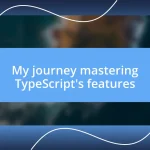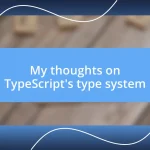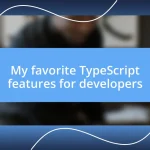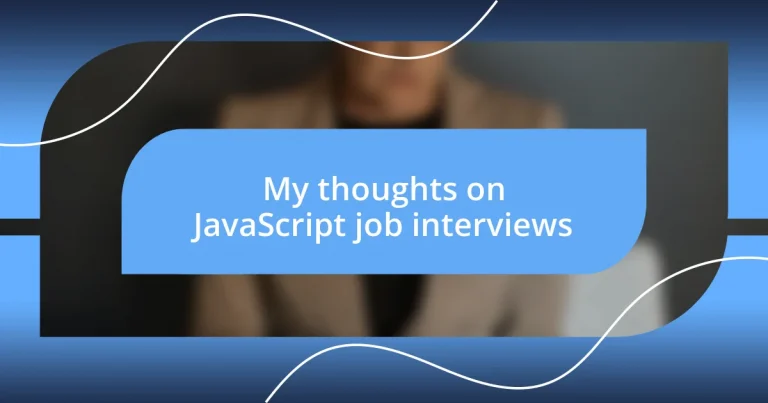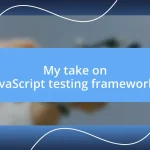Key takeaways:
- Balancing technical skills and interpersonal abilities is crucial in JavaScript interviews, highlighting the importance of problem-solving communication and cultural fit.
- Familiarity with JavaScript fundamentals, front-end frameworks, and code quality practices significantly enhances a candidate’s competitiveness in interviews.
- Post-interview follow-up is essential; expressing gratitude and referencing specific discussions can reinforce a candidate’s interest and leave a positive impression.
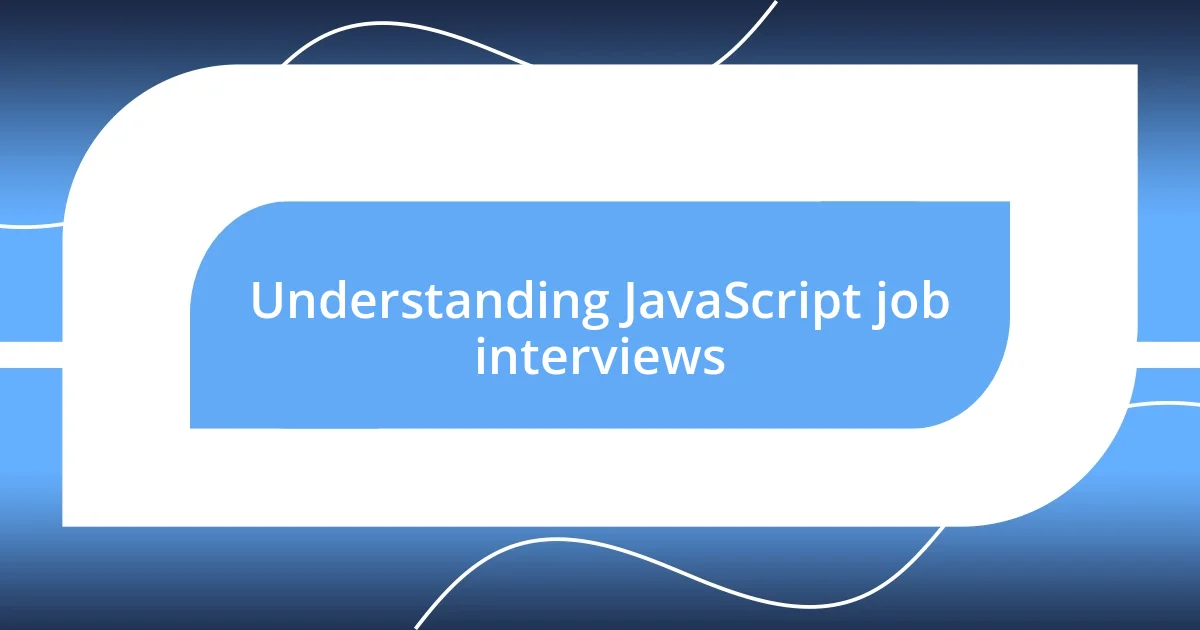
Understanding JavaScript job interviews
JavaScript job interviews can feel daunting, especially when you’re standing in front of a panel of experts. I recall my first interview; I was overwhelmed by the variety of questions they threw my way. It made me wonder, what’s the best way to balance technical knowledge and interpersonal skills in these situations?
One aspect that really stood out to me is the focus on problem-solving abilities. You might encounter coding challenges on a whiteboard or during a live coding session. I once faced a tricky algorithm question that left me momentarily stunned. Reflecting on it now, I realize that how I communicated my thought process—and not just the final answer—was just as important. Have you ever found yourself getting stuck but managing to articulate your way through a problem?
Additionally, cultural fit has become a critical component of the interview process. Companies want to see if you’re not only a skilled coder but also a teammate who can contribute positively to their environment. During one of my interviews, they asked about my experiences working in teams and how I handled conflicts. This made me think about the importance of both technical skills and soft skills. How do you convey your personality alongside your skill set?
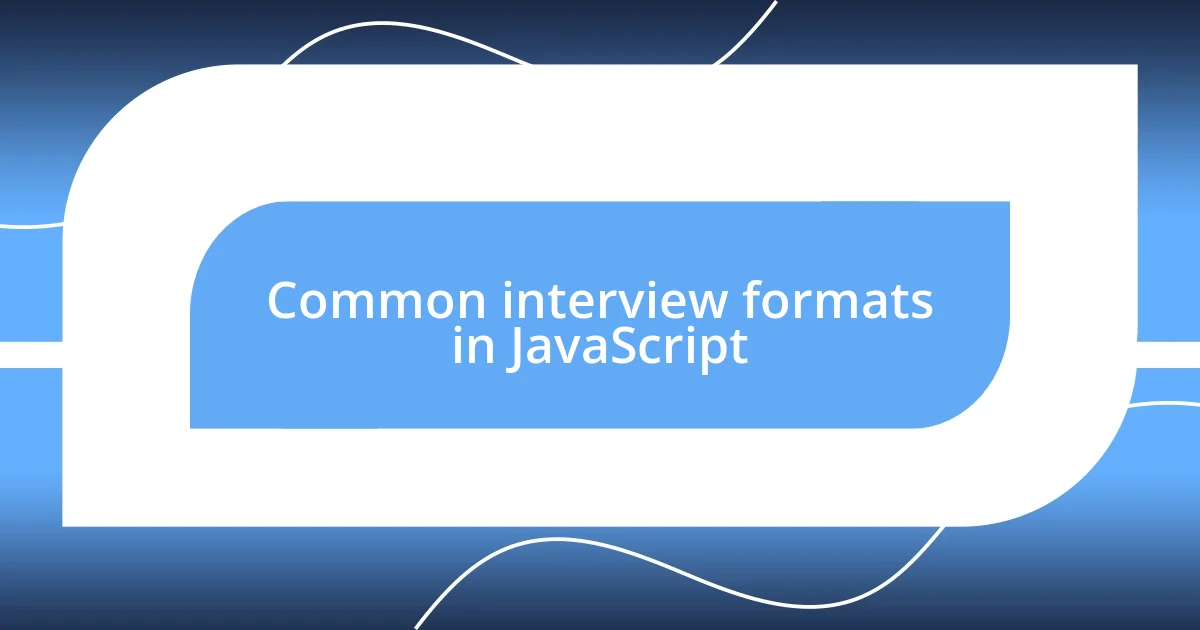
Common interview formats in JavaScript
When it comes to JavaScript interviews, I’ve noticed several common formats that help companies gauge both technical expertise and interpersonal skills. For instance, the traditional technical interview often includes coding challenges, system design discussions, and behavioral questions. I remember feeling a mix of excitement and nervousness when faced with algorithm problems, alongside questions about previous project experiences. It’s fascinating how each format reveals different sides of a candidate.
Here are some typical interview formats for JavaScript jobs:
- Coding Challenge: Solve algorithm or data structure problems live or through an online platform.
- System Design Interview: Discuss the architecture of a JavaScript application, emphasizing scalability and performance.
- Behavioral Questions: Share experiences related to teamwork, conflict resolution, and project challenges to assess cultural fit.
- Take-home Assignments: Complete a coding task at your own pace and submit it for review, giving you the opportunity to demonstrate your skills in a less pressured environment.
- Pair Programming: Collaborate with an interviewer in real-time, which allows them to evaluate your code and communication style simultaneously.
Each format serves as a window into how you think and work, revealing much about your approach to JavaScript and your ability to contribute to a team.
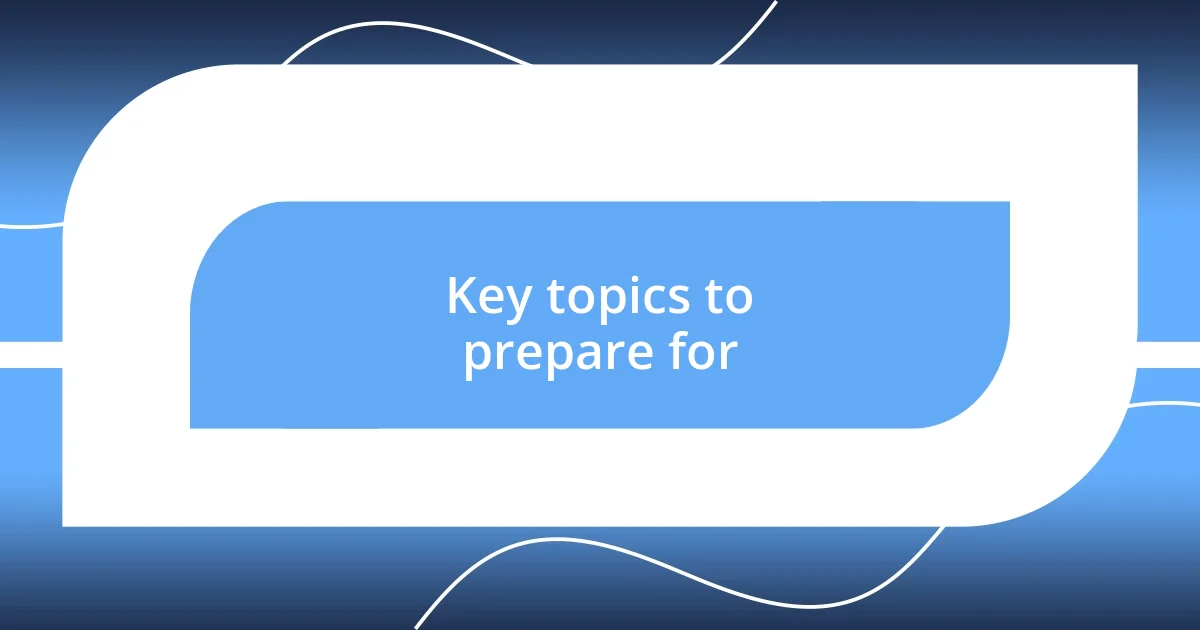
Key topics to prepare for
When preparing for JavaScript job interviews, it’s crucial to revisit some core topics. I’ve found that a deep understanding of JavaScript fundamentals, such as closures, promises, and asynchronous programming, often sets candidates apart. I remember one interview where a seemingly simple question about closures turned into a detailed discussion, highlighting my grasp of scope and execution context. Can you recall a time when mastering a fundamental concept made all the difference?
Another key area to focus on is front-end frameworks associated with JavaScript, like React or Vue.js. Many companies lean heavily on specific technologies, and showing familiarity can be a game-changer. Once, during an interview, I was asked to explain how React’s virtual DOM worked, and sharing my hands-on experience made a strong impression. Have you ever felt more confident discussing a topic because you had practical knowledge to back it up?
Lastly, don’t overlook best practices in writing maintainable code, including code reviews and version control systems like Git. I once encountered an interview that featured a live code review where I had to explain my thought process behind my commit messages. That moment made me appreciate the importance of clean coding conventions. How do you illustrate your commitment to writing high-quality code during your interviews?
| Key Topic | Description |
|---|---|
| JavaScript Fundamentals | Understanding closures, promises, and asynchronous programming. |
| Front-end Frameworks | Familiarity with frameworks like React and Vue.js. |
| Code Quality Practices | Best practices in writing maintainable code and using version control. |
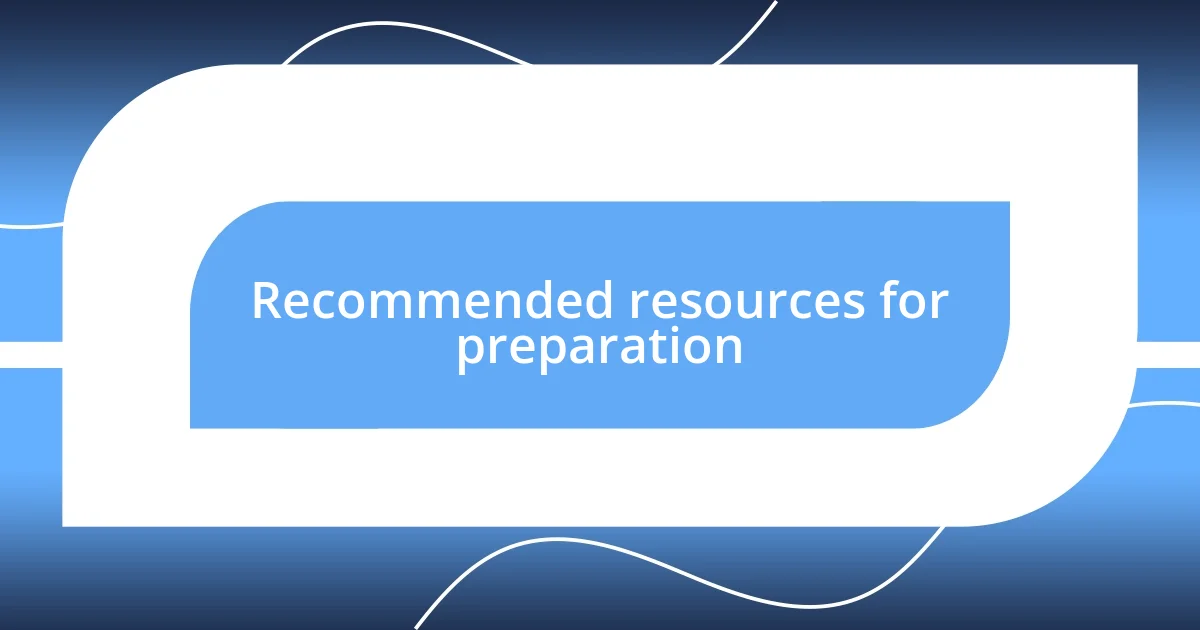
Recommended resources for preparation
When it comes to preparing for JavaScript job interviews, I can’t recommend enough the value of online coding platforms like LeetCode and HackerRank. I remember scouring these platforms for hours to tackle various coding challenges, and it truly sharpened my problem-solving skills. It can feel overwhelming at first, but as you see your progress over time, the sense of achievement is genuinely worth the effort. Have you taken the plunge into coding challenges yet?
Additionally, I found that reviewing resources like Mozilla Developer Network (MDN) can deepen your understanding of JavaScript concepts. I often turned to MDN during my studies, especially for clarifying tricky topics. It’s rich with examples and documentation, making it a go-to for any concept you might need to brush up on. How much value do you place on comprehensive documentation in your learning process?
Lastly, engaging with community platforms like Stack Overflow and GitHub not only hones your technical skills but also builds your network. I would often find solutions to my coding dilemmas on these platforms, and the interactions would lead to valuable discussions. It’s fascinating how sharing knowledge can lead to learning from others as well. Have you experienced the power of community support in your own preparation journey?
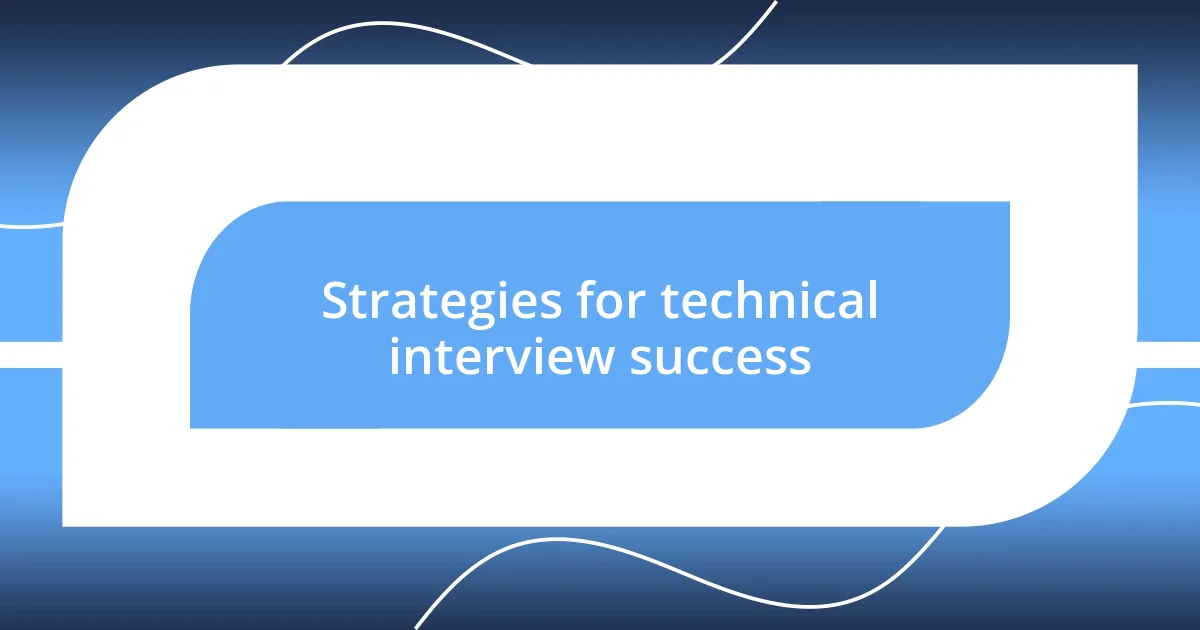
Strategies for technical interview success
During a technical interview, clear communication can be just as critical as coding skills. I learned this firsthand when a candidate was asked to describe their thought process while solving a problem, and they articulated their reasoning step by step. This approach not only gave the interviewers insight into their problem-solving abilities but also showcased their confidence. Have you ever considered how effectively sharing your thought process can make a strong impression?
Practicing mock interviews can be a game-changer. I once joined a peer group where we simulated real interviews, and it was eye-opening. The constructive feedback from peers, combined with the real-time pressure of answering questions, helped reduce my anxiety significantly on the actual day. Have you ever participated in a mock interview, and if so, how did it change your perspective?
Lastly, always be ready to ask insightful questions about the role and the team. During my last interview, I inquired about the team’s approach to innovation and how they handle feedback. This not only illustrated my enthusiasm for the position but also allowed me to assess if the company aligned with my values. I find that asking meaningful questions can transform the interview from a one-sided evaluation into a more interactive conversation. What kinds of questions have you found most revealing in your interviews?
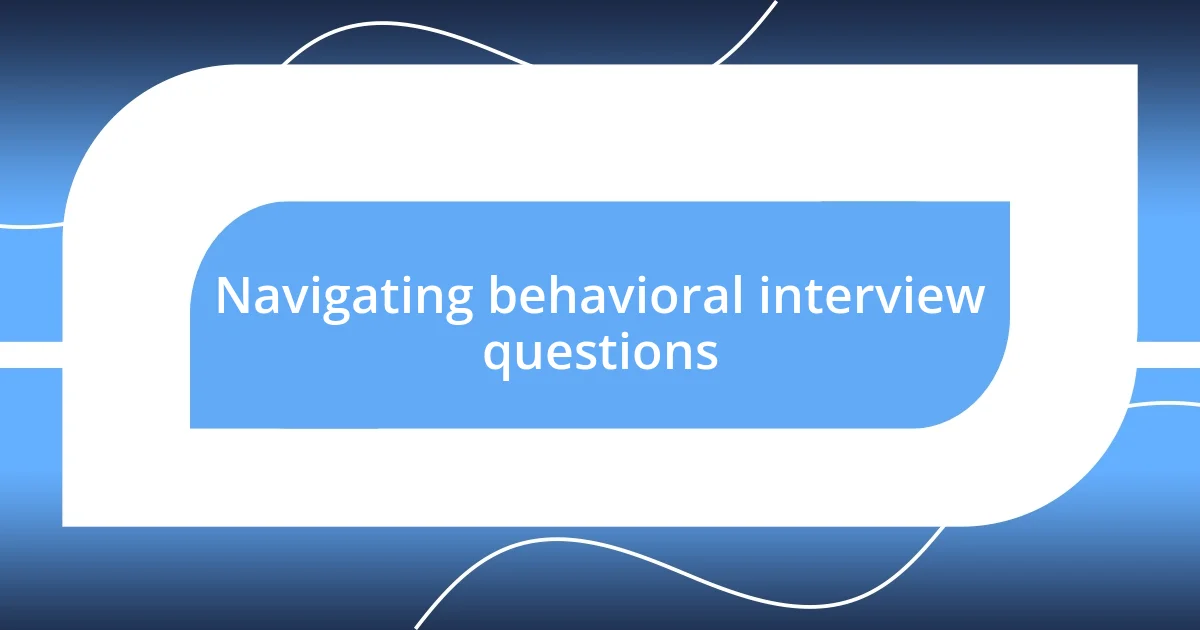
Navigating behavioral interview questions
Navigating behavioral interview questions can sometimes feel like walking through a maze, especially when emotions run high. I still recall one interview where I was asked about a time I faced a conflict with a coworker. As I shared my experience, I felt myself reliving that moment—the stress was palpable, but articulating how I resolved it showcased my interpersonal skills. How have you approached sharing your experiences with conflict?
Understanding the STAR method—Situation, Task, Action, Result—has been crucial for me in shaping my responses. By structuring my answers this way, I provided clear, concise examples of my experiences, making my stories memorable. One time, when discussing a project I led, using this method highlighted not just what I did, but the impact it made on the team and the overall outcome. Do you think having a structured approach can enhance your storytelling in interviews?
I often remind myself that these questions are an opportunity, not a hurdle. When I was probed about my greatest failure, I chose to frame it positively by reflecting on the lessons learned and how it shaped my resilience. It’s insightful to remember that interviewers are looking for your growth mindset as much as your technical skills. How do you convey the value of your experiences, even the challenging ones, during interviews?
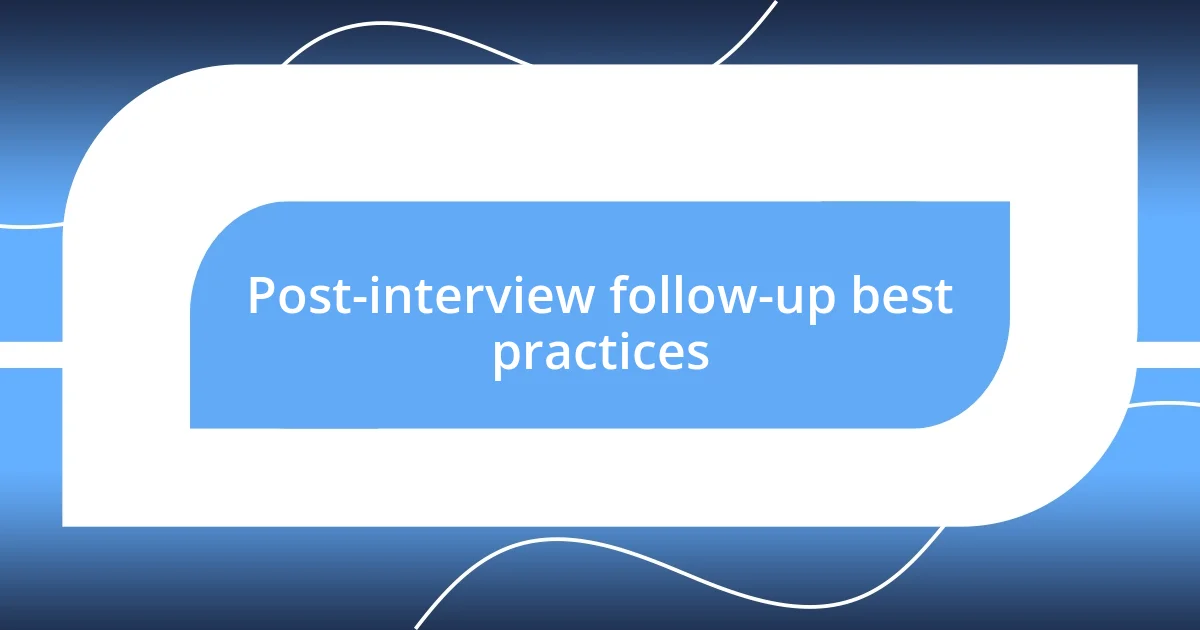
Post-interview follow-up best practices
Following up after an interview is an important step that I believe many candidates overlook. After my last interview, I sent a thank-you email within 24 hours, expressing my appreciation for the opportunity and reiterating my excitement about the position. This simple gesture reminded the interviewers of my interest and allowed me to connect on a more personal level, which I found beneficial.
If you can, reference a specific conversation or insight from the interview in your follow-up. I once mentioned a project I was excited about during an interview, and in my thank-you note, I included a related idea that popped into my mind afterward. This approach not only demonstrated my enthusiasm but also showcased my initiative. Have you ever thought about how a small detail can leave a lasting impression?
Timing is critical, too. I recommend waiting about a week after sending your initial follow-up before reaching out again if you haven’t heard back. When I was in a similar situation, I crafted a polite inquiry about the hiring timeline, which showed my continued interest without seeming overly eager. Balancing persistence and patience can be tricky, but it’s an essential part of the follow-up process, don’t you agree?
